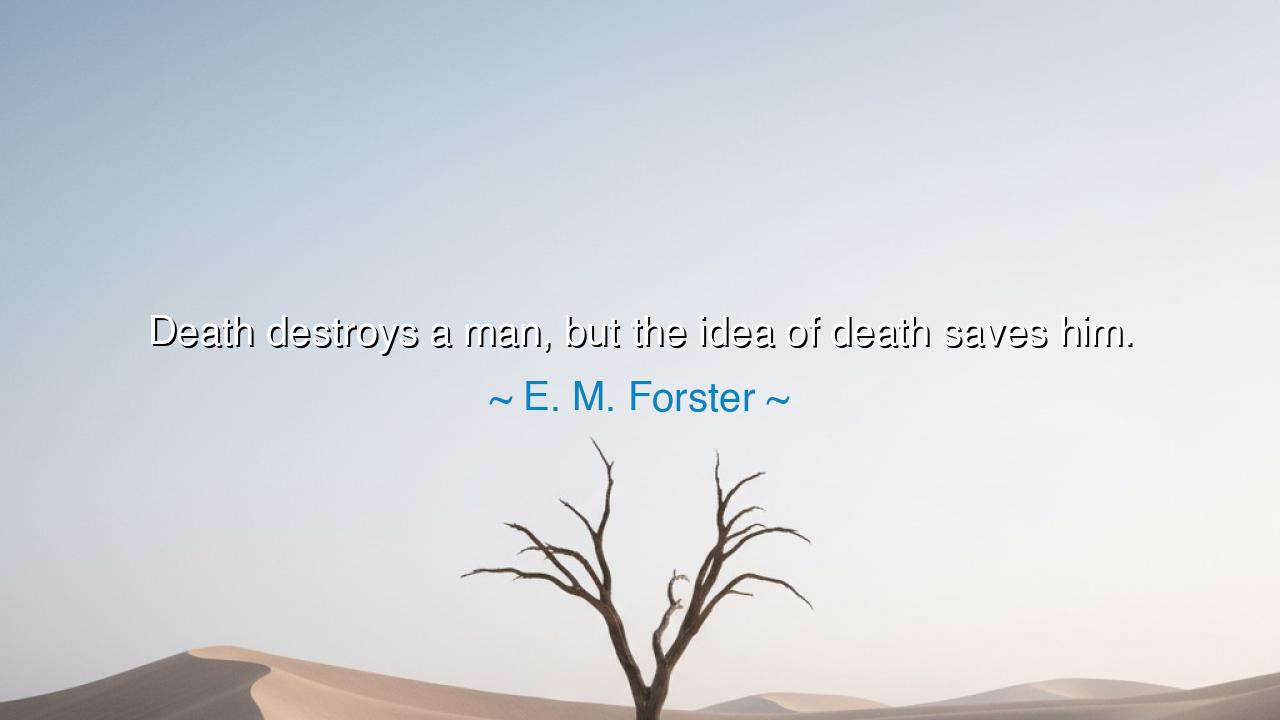
Death destroys a man, but the idea of death saves him.






The English writer E. M. Forster once uttered a truth so profound it trembles through the ages: “Death destroys a man, but the idea of death saves him.” In these words lies a paradox that only the wise can understand. Death, that dark shadow feared by mortals since the dawn of time, comes to all alike — kings and beggars, saints and sinners. It destroys the body, silences the voice, and scatters the dust of our mortal form. Yet the idea of death, the solemn knowledge that our days are numbered and fleeting, awakens the soul. It is this awareness that saves a man — not from dying, but from never truly living.
In the ancient lands, philosophers spoke often of memento mori, the remembrance of death. They did not whisper it as a curse, but as a call to wisdom. For when one knows that life is short, each dawn becomes sacred, and each act gains meaning. The idea of death strips away vanity and pride; it reminds us that gold cannot buy more time, and glory cannot halt the sunset. Thus, the thought of our end becomes the beginning of understanding. It teaches us humility, compassion, and courage — for what can we fear, if we already know the inevitable?
Consider the life of Socrates, who, when condemned to die, drank the hemlock with serenity and grace. To the eyes of men, death destroyed him; his body fell silent, his teaching ceased. But in truth, the idea of death had long saved him. He had lived each day as a seeker of truth, unafraid of the end, knowing that philosophy itself is a preparation for dying. His calm acceptance, his devotion to wisdom, transformed his death into immortality. He became a living symbol of how death, rightly understood, liberates the spirit.
Likewise, the great emperor Marcus Aurelius, though surrounded by wealth and power, wrote nightly in his journals of death and impermanence. “You could leave life right now,” he reminded himself, “Let that determine what you do and say and think.” The emperor, who could command armies, humbled himself before the truth that all men must perish. The idea of death saved him from arrogance, from waste, from the illusion of control. It made him just, merciful, and wise. Though death destroyed his flesh, his words endure, a lantern for every soul that walks through darkness.
When a man forgets death, he becomes reckless — wasting time on trivial quarrels, chasing illusions of power or pleasure. He builds monuments of pride that crumble before the wind. But when he remembers that each breath may be his last, his heart softens. He speaks gently. He loves fiercely. He labors with meaning. The idea of death, like a stern teacher, instructs him to live righteously, to forgive, to cherish, to give thanks for the gift of being. It saves him from the living death of indifference and pride.
There is, within every human soul, a quiet knowing — that to live wisely is to live as if each day were both the first and the last. The idea of death does not darken life; it brightens it, as a candle glows brighter against the night. It teaches balance: to dream, yet not to cling; to strive, yet not to boast; to love, yet not to possess. Thus, when death finally comes, the wise man greets it not as an enemy, but as a friend long expected — the doorway to the infinite.
So remember, my child, death will destroy you, as it destroys all. But let that knowledge save your soul. Each morning, greet the rising sun as though it were your last dawn upon the earth. Speak truth before it is too late. Give kindness freely, without calculation. Do not postpone forgiveness, nor delay joy. Walk among men as one whose time is precious, whose heart is awake. For the idea of death is not a curse — it is the most sacred blessing, the one that teaches us how to live, and how to die unafraid.






AAdministratorAdministrator
Welcome, honored guests. Please leave a comment, we will respond soon